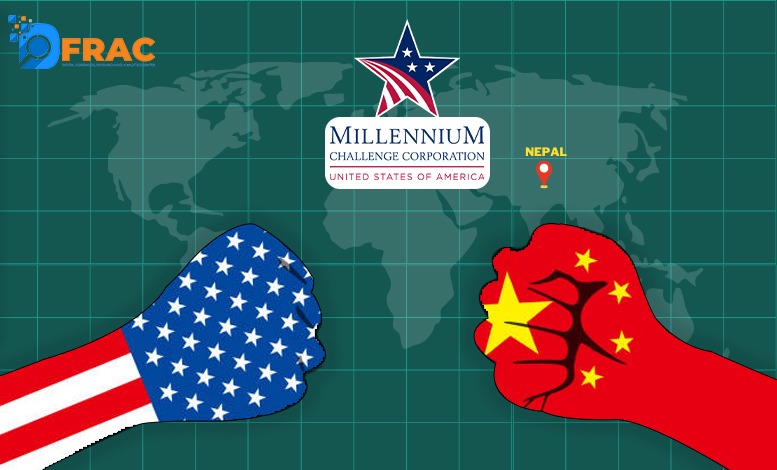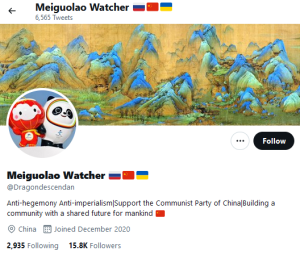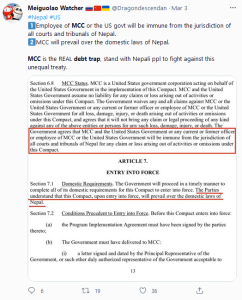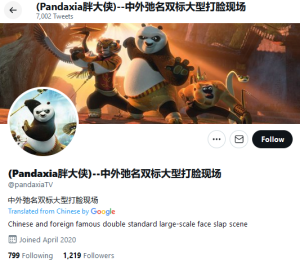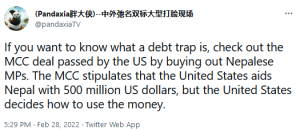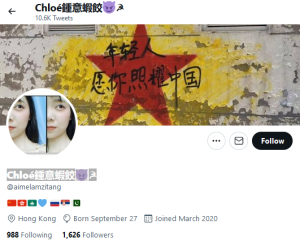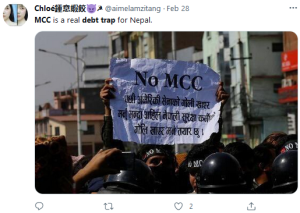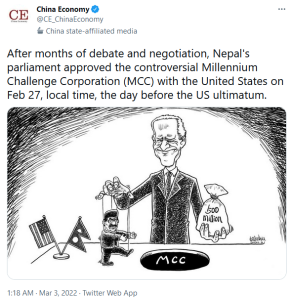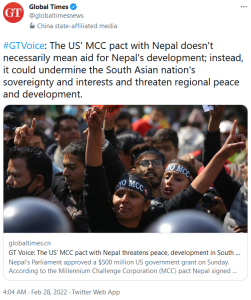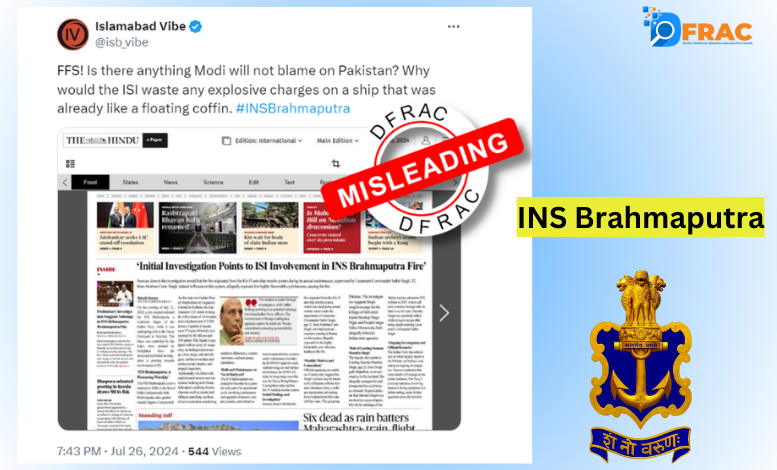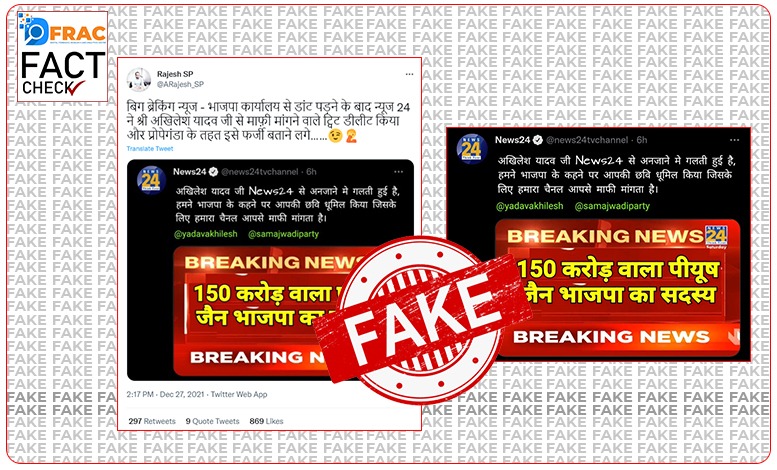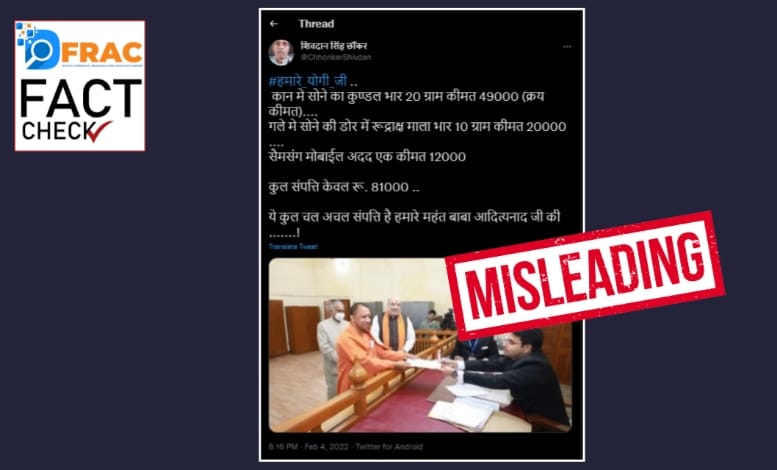In September 2017, the U.S. Government’s Millennium Challenge Corporation (MCC) signed a $500 million grant agreement with the Government of Nepal. The MCC-Nepal Compact aims to increase the availability and reliability of electricity, maintain road quality, and facilitate regional trade– helping to spur investments, accelerate economic growth, and reduce poverty.
But due to some obstructions and changes in the Nepal government, the approval got delayed. Finally, Parliament ratifies the MCC compact on 27th Feb 2022.
Possible Benefits to Nepal as per U.S. Embassy in Nepal
- Strengthening Economic growth, expanding the energy sector, and creating business opportunities.
- Widely available and reliable electricity and safer roads
- Construction of power lines generated by Nepalese hydropower resources to over two-thirds of the homes and businesses across Nepal.
- Increase access to clean energy while protecting the climate.
Chinese stance against MCC
According to the Chinese news mouthpiece, Global Times, and South China Morning Post, it can be seen that Chinese people see this MCC project as a threat to Nepal and China’s relations.
| South China Morning Post Article | Global Times Article |
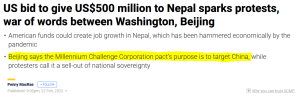 |
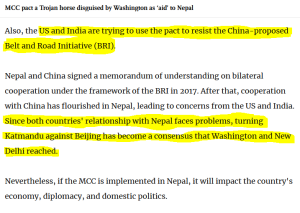 |
Major ‘We Chat’ pages also shared the articles on the same topic, showing that with the approval of MCC, Nepal has moved closer to the USA.
- Nepal approves MCC, US presence in the Himalayas by 尼泊尔旅行 (https://mp.weixin.qq.com/s/vr1wMSNySajlJyWsqrquTg)
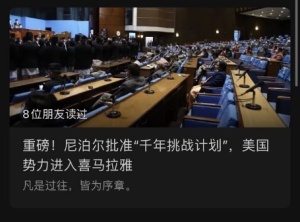
- MCC passed! Nepal has moved closer to the United States, sparking an outcry in Kathmandu by 尼泊尔快讯 (https://mp.weixin.qq.com/s/QhMvThoLL-iVGNfnWIJUGA)

- Nepal officially becomes a “semi-colony” after US victory by 新尼泊尔 (https://mp.weixin.qq.com/s/vr1wMSNySajlJyWsqrquTg)

Global Times and China News shared a statement on Weibo
- China News opted for a softer tone and neutral content in their post with the hashtag: China will continue to support the Nepali people in their independent choice of development path (#中方将一如既往支持尼人民自主选择发展道路)

- Global Times kept it biased. The majority of the comment on this post are convinced that Nepal has sold its sovereignty and now this is a security threat to China.
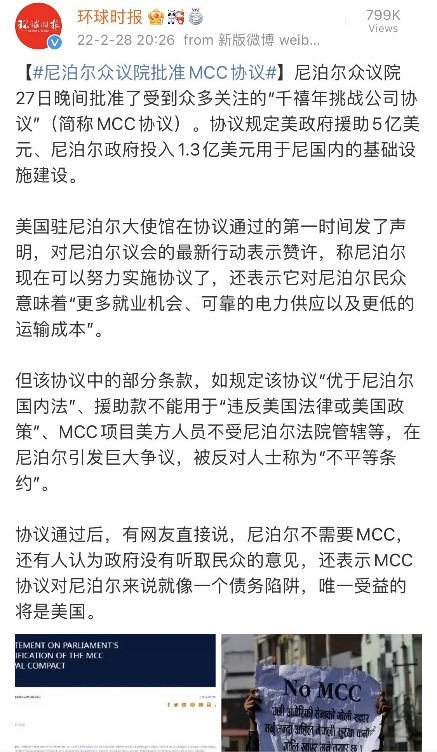
Chinese Social media Influencers targeting MCC
Chinese Social media influencers, also known by the name of Wumao Accounts as described in our previous article, “Chinese Twitter Army: Whitewashing the negativity about China on Social Media”, tweeting that the MCC project is a debt-trap by America.
An account named Arnaud Bertrand, a well-known Wumao Account shared a tweet regarding debt-trap by America.
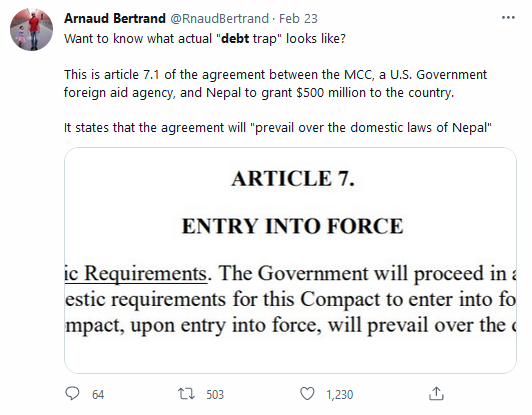
This account has shared a thread trying to convince people that MCC is a mere debt trap. This tweet has been retweeted and quoted by various other Wumao Accounts as well to make the debt trap perception and by this Nepal will lose its sovereignty.
Verified accounts that were retweeted are Chen Weihua, China Daily EU Bureau Chief columnist, and CAO Yi, Consul, Embassy of China in Lebanon.
Other Wumao Accounts that tweeted MCC to be a debt-trap
Reactions of Chinese Diplomats/ Officials/ Media Persons:
- Statement of Former Chinese defense attache in Nepal, Cheng Xizhong on Nepal-MCC Compact
Article of Asia Pacific Daily shares viewpoints of Cheng Xizhong – “The US should not rejoice too soon, the suffering is still in the future, Nepali politicians will play the US to death.”
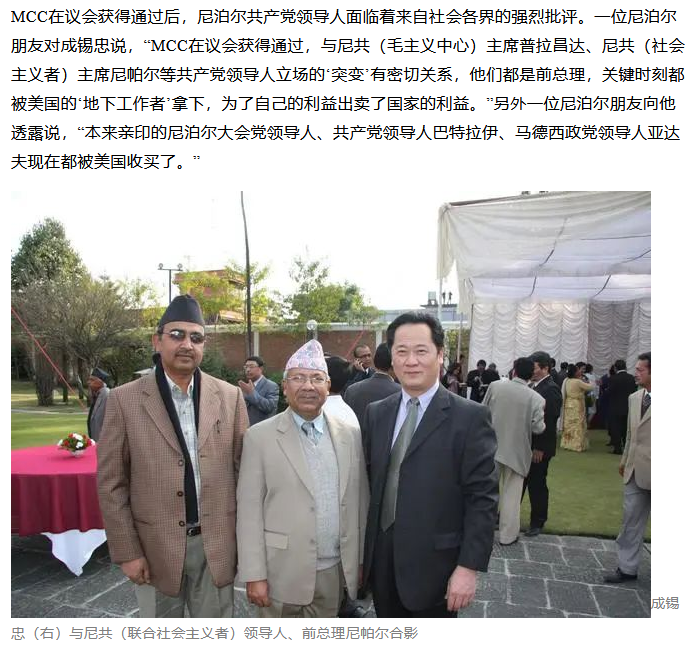
Figure: Asia Pacific Daily’s Article
- Statement of Hua Chunying, a Chinese official and former diplomat serving as spokesperson for the Ministry of Foreign Affairs of the People’s Republic of China on MCC.

Figure: Tweet by Hua Chunying on MCC
- China’s state-affiliated media statement
| Link: https://twitter.com/CE_ChinaEconomy/status/1499313331139538949
|
Link: https://twitter.com/globaltimesnews/status/1498267794416168962
|
- Phoenix TV posted this comic to simplify MCC in Nepal for the Chinese readers
Phoenix Television is a partially state-owned television network that offers Mandarin and Cantonese-language channels that serve the Chinese mainland, Hong Kong, Macau, Taiwan and other markets with substantial Chinese-language viewers.
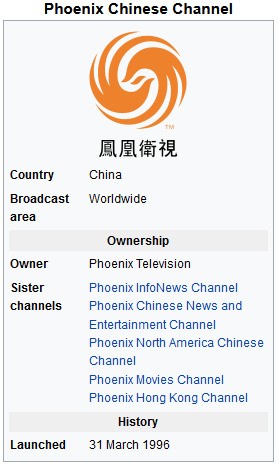
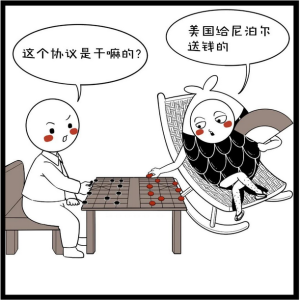 |
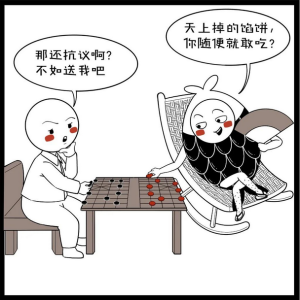 |
In this comic, China specifically covered three points that
- While using the money granted by the US in MCC, you cannot violate US law & policy.
- Power transmission projects near India will require India’s consent.
- MCC employees are not subject to the laws of Nepal and, when the agreement comes into force, are above the laws of Nepal
(Credit: @r_rajbhandari )
Conclusion
MCC is an independent U.S. foreign aid agency established by congress to offer “time-limited grants for promoting economic growth, reducing poverty, and strengthening development,” to the low and lower-middle-income countries through a selection process based on 20 policy indicators.
China itself has entangled smaller countries like Sri Lanka and Angola into its debt-trap diplomacy. But now it is using all the gimmicks to term the MCC-Nepal deal as a debt trap.
It is pretty much clear by China’s gesticulation that it is stressing over blocking the U.S. Government’s Millennium Challenge Corporation (MCC) agreement with the Government of Nepal. China cannot tolerate the U.S making relations with its neighboring country and investing in them. It is a potential threat to China’s plan of maintaining its hegemony over its neighboring countries. China’s increasing interference in Nepal’s internal matter is a potential threat to Nepal’s sovereignty.


